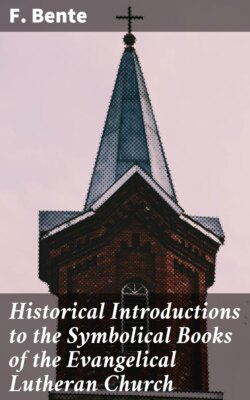Historical Introductions to the Symbolical Books of the Evangelical Lutheran Church

Реклама. ООО «ЛитРес», ИНН: 7719571260.
Оглавление
F. Bente. Historical Introductions to the Symbolical Books of the Evangelical Lutheran Church
Historical Introductions to the Symbolical Books of the Evangelical Lutheran Church
Table of Contents
Book of Concord, or Concordia, is the title of the Lutheran corpus doctrinae, i.e., of the symbols recognized and published under that name by the Lutheran Church. The word symbol, sumbolon, is derived from the verb sumballein, to compare two things for the purpose of perceiving their relation and association. Sumbolon thus developed the meaning of tessara, or sign, token, badge, banner, watchword, parole, countersign, confession, creed. A Christian symbol, therefore, is a mark by which Christians are known. And since Christianity is essentially the belief in the truths of the Gospel, its symbol is of necessity a confession of Christian doctrine. The Church, accordingly, has from the beginning defined and regarded its symbols as a rule of faith or a rule of truth. Says Augustine: "Symbolum est regula fidei brevis et grandis: brevis numero verborum, grandis pondere sententiarum. A symbol is a rule of faith, both brief and grand: brief, as to the number of words, grand, as to the weight of its thoughts."
SOLI DEO GLORIA!
Отрывок из книги
F. Bente
Published by Good Press, 2020
.....
Nathanael confessed: "Rabbi, Thou art the Son of God; Thou art the King of Israel," John 1, 49, the apostles confessed: "Thou art the Christ, the Son of the living God," Matt. 16, 16; Peter confessed: "We believe and are sure that Thou art that Christ, the Son of the living God," John 6, 69; Thomas confessed: "My Lord and my God," John 20, 28. These and similar confessions of the truth concerning Himself were not merely approved of, but solicited and demanded by, Christ. For He declares most solemnly: "Whosoever therefore shall confess Me before men, him will I confess also before My Father which is in heaven. But whosoever shall deny Me before men, him will I also deny before My Father which is in heaven," Matt. 10, 32. 33. The same duty of confessing their faith, i.e., the truths concerning Christ, is enjoined upon all Christians by the Apostle Paul when he writes: "If thou shalt confess with thy mouth the Lord Jesus and shalt believe in thine heart that God hath raised Him from the dead, thou shalt be saved," Rom. 10, 9.
In the light of these and similar passages, the trinitarian baptismal formula prescribed by Christ evidently required from the candidate for Baptism a definite statement of what he believed concerning the Father, Son and Holy Ghost, especially concerning Jesus Christ the Savior. And that such a confession of faith was in vogue even in the days of the apostles appears from the Bible itself. Of Timothy it is said that he had "professed a good profession before many witnesses," 1 Tim. 6, 12. Heb. 4, 14 we read: "Let us hold fast our profession." Heb. 10, 23: "Let us hold fast the profession of our faith without wavering." Jude urges the Christians that they "should earnestly contend for the faith which was once delivered unto the saints," and build up themselves on their "most holy faith," Jude 3. 20. Compare also 1 Cor. 15, 3. 4; 1 Tim. 3, 16; Titus 1, 13; 3, 4–7.
.....